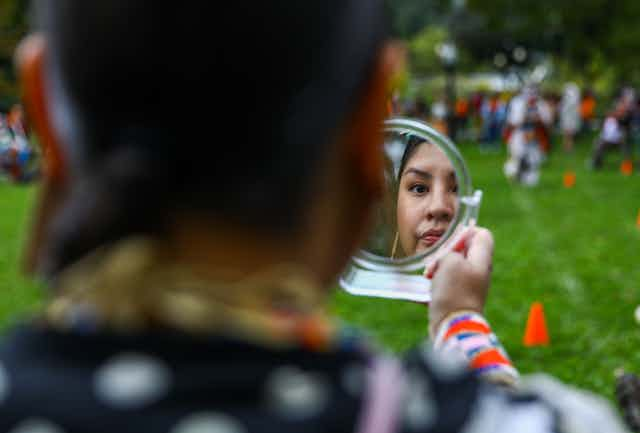In this episode of Don’t Call Me Resilient, we talk about something we’ve heard a lot about in the last few years: People getting called out for falsely claiming Indigenous identity.
Sometimes, these claims are based on old family myths — maybe a distant relative or a trace of Indigenous blood. But being Indigenous is more than just genealogy.
Many Indigenous people define belonging as having a community claim you and having truly lived Indigenous experiences. Some others are simply pretending — taking away opportunities and resources meant for Indigenous Peoples.
And if we take a look at recent headlines, it seems tolerance for these so-called pretendians is running out.
In the United States, there was Andrea Smith, a prominent academic and activist. She was back in the news after yet another story accused her of faking her Cherokee ancestry.
Here in Canada, we had the case of prominent filmmaker Michelle Latimer. She stepped down as the director of the much-loved TV series Trickster after her claim to Algonquin and Métis heritage was publicly challenged. Latimer hired a team of experts to trace her roots — and based on the findings, maintains she is a direct descendant of Indigenous people.
And at Queens University earlier this year, an anonymous report accused several faculty and staff of falsely claiming Indigenous identity. An open letter signed by more than 100 Indigenous scholars called on the university to do better with its vetting process during hiring.
Our two guests for this episode were among those who signed that letter. They both tackle the complexities of Indigenous identities in their work.
Veldon Coburn is Algonquin from Pikwàkanagàn First Nation. He is an assistant professor in the Institute of Indigenous Research and Studies at the University of Ottawa.
And Celeste Pedri-Spade is Anishinaabe from Lac Des Mille Lacs First Nation. She is an artist, and associate professor and Queen’s National Scholar in Indigenous Studies at Queen’s University.
For a full transcript of this episode of Don’t Call Me Resilient, go here.
Additional reading
How some North Americans claim a false Indigenous identity
Ancestral languages are essential to Indigenous identities in Canada
How ‘pretendians’ undermine the rights of Indigenous people
Pretendians and what to do with people who falsely say they’re Indigenous
Push to remove ‘pretendians’ from Algonquin membership rekindled after CBC investigation
Vancouver arts curator’s Indigenous ancestry claims panned as ‘pretendian’
Follow and listen
Listen and follow Don’t Call Me Resilient on Apple Podcasts, Google Podcasts, Spotify or wherever you listen to your favourite podcasts. We’d love to hear from you, including any ideas for future episodes. Join The Conversation on Twitter, Facebook and Instagram and use #DontCallMeResilient.
Don’t Call Me Resilient is a production of The Conversation Canada. This podcast was produced with a grant for Journalism Innovation from the Social Sciences and Humanities Research Council of Canada. The series is produced and hosted by Vinita Srivastava. Our producers for this episode are: Haley Lewis and Susana Ferreira. Our associate producer is Ibrahim Daair. Reza Dahya is our sound producer. Our consulting producer is Jennifer Moroz. Lisa Varano is our audience development editor and Scott White is the CEO of The Conversation Canada. Zaki Ibrahim wrote and performed the music we use on the pod. The track is called Something in the Water.

